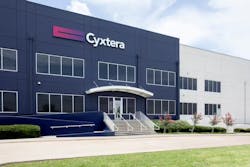Data Center Frontier editors Matt Vincent and David Chernicoff recently caught up with Cyxtera's Field CTO Holland Barry on the occasion of Cyxtera and Hewlett Packard Enterprise (HPE) announcing a new collaboration to help simplify customers' hybrid IT strategies.
Cyxtera is now leveraging HPE's GreenLake edge-to-cloud platform to support an enterprise bare metal platform. The podcast discussion extends to how Cyxtera is presently focused on supporting AI workloads in data centers and collaborating with HPE to offer a multi-hybrid cloud strategy.
Barry revealed during the podcast that Cyxtera already supports 70 kilowatt racks in 18 markets, and is discussing expanded deployments with its customers and partners. Barry added that many present customers are considering moving to private cloud platforms, due to rising public cloud costs and unexpected fees.
Barry said, "My function here at Cyxtera deals largely with the technologies that we both implement internally and also that we deploy within the data centers themselves to make sure that experience of being in the data center colo facility is seamless, feels as much like cloud as it can in terms of the provisioning of services, how we bill for things, things like that."
He added, "Generally speaking, I'm a technologist at heart and I just want to make sure that what we're building is what's useful for the market to consume."
Here's a list of key points discussed on the podcast:
2:01 - Barry talks about Cyxtera's vision for supporting AI workloads in data centers, including cooling technologies, network speed, power designs, and accommodating adjacencies with edge and public cloud platforms.
4:18 - DCF's Chernicoff asks if Cyxtera will offer 70 kilowatt racks a la Digital Realty. Barry explains that Cyxtera already supports this capacity in 18 of its markets, and is in active discussions with customers and partners over an expansion.
5:40 - Barry discusses how Cyxtera's collaboration with HPE addresses rising cloud costs and furthers a multi-hybrid cloud strategy, including Cyxtera's new enterprise bare metal platform and options for opex financing models.
7:53 - Use cases for customers moving to the HPE GreenLake solution via Cyxtera are discussed, including repatriating cloud workloads and tech refreshes.
15:03 - Asked about the convergence of cloud and hybrid IT strategies, Barry says that Cyxtera views themselves as part of such transformations and says the provider is up front with its customers about what workloads are best suited for their platform. The trend of recalibrating workloads from the public cloud to data centers for better cost management is also discussed.
18:22 - Barry expounds on how egress fees and other unexpected costs can lead to a "death by 1000 cuts" situation for public cloud users, driving them to consider private cloud options
19:57 - Barry observes that many customers are realizing the costs of the public cloud and considering moving to a private cloud solution, and emphasizes the importance of Cyxtera making this transition as easy as possible through technology choices and partnerships.
21:57 - Barry comments on the new Cyxtera partnership with HPE in the context of providing choices and solutions to make moving customer workloads to their venue as easy as possible, with the goal of building a multi-hybrid cloud reality in the future.
Background on Cyxtera
Cyxtera Technologies operates a global network of 60 data centers, supports 2,300 customers, and had $746 million in revenue in 2022. The company was formed in 2016 when Medina Capital, led by former Terremark CEO Manuel Medina, teamed with investors including BC Partners to buy the data center portfolio of CenturyLink for $2.15 billion. It was at that time one of several data center players seeking to build a colocation business atop a portfolio of data centers spun off by telecom companies.
This April, Data Center Frontier's Rich Miller reported that Cyxtera Technologies was reportedly fielding interest from suitors as it sought to reduce its debt load. Data Center Dynamics at that time shared that Cyxtera was exploring options for a sale or capital raise, citing a Bloomberg story that said private equity suitors were studying the company's operations. Shares of Cyxtera had fallen sharply in value during that timeframe and were trading at 31 cents a share at one point, giving the company a market capitalization of about $55 million, a far cry from the $3.4 billion valuation placed on the company when it went public in 2021 through a merger with Starboard Value Acquisition Corp.
In May, as shares of Cyxtera fell to new lows, DCF reported lenders for the company said they would provide the colocation provider with $50 million in new funding, allowing it more time to arrange a sale or line up new capital. In June, the colocation provider filed for Chapter 11 bankruptcy. After working for months to find a buyer or reduce its debt load, the company decided it would now restructure through a pre-packaged bankruptcy.
The Chapter 11 filing was part of an arrangement with its lenders, who retained the right to gain a controlling equity interest in the company under terms of a restructuring agreement. At the time of the bankruptcy filing, some of the company's lenders committed to provide $200 million in financing to enable Cyxtera to continue operating as it restructures.
"Cyxtera expects to use the Chapter 11 process to strengthen the company's financial position, meaningfully deleverage its balance sheet and facilitate the business’s long-term success," the company said in a press release." More details have been made available on Cyxtera's restructuring web site. Cyxtera subsidiaries in the United Kingdom, Germany and Singapore are not included in the bankruptcy case, which was filed in New Jersey.
Dgtl Infra's Mary Zhang has done significant recent reporting over the summer on the story of Cyxtera's existing lease rejections in wake of the bankruptcy filing, as well as charting the company's timeline extension for its bankruptcy-led sale process into late September.
In his June reporting on Cyxtera's bankruptcy filing, DCF's Miller noted that:
"Since Cyxtera leases many of its data centers, Cyxtera's Chapter 11 filing creates a potential challenge for its landlords. Cyxtera leases space in 15 facilities operated by Digital Realty, representing $61.5 million in annual revenue, or about 1.7 percent of Digital's annual revenue.
It also leases space in 6 data centers owned by Digital Core REIT, a Singapore-based public company sponsored by Digital Realty. That includes two sites in Los Angeles, three in Silicon Valley and one in Frankfurt. The $16.3 million in annual rent from Cyxtera represents 22.3 percent of revenue for Digital Core REIT.
A bankruptcy filing provides debtors with the opportunity to reject leases to reduce their real estate costs. In its press release, Cyxtera noted that it "is continuing to evaluate its data center footprint, consistent with its commitment to optimizing operations."
An August report from Bloomberg stated that Cyxtera had drawn interest for its assets from multiple parties, including Brookfield Infrastructure Partners and Digital Realty Trust Inc., according to people with knowledge of the situation. as reported by Bloomberg's Reshmi Basu.
In a recent email to this editor regarding Cyxtera, DCF's Miller opined further:
"The key questions for Cyxtera are really all about the bankruptcy outcome, and where that stands. The future could be very different for Cyxtera depending who the winning bidder is and whether they would reject leases. For example, Digital Realty is reported to be one of the bidders. That makes sense, as Cyxtera leases 12 facilities from them and DLR has a vested interest in protecting that income. But if Digital wins the auction, do they keep leasing space in Cyxtera’s many non-Digital sites? Or do they reject those leases and consolidate? The auction winner will guide future strategy for Cyxtera. And it could be very different if it’s a private equity firm vs. a strategic buyer like Digital Realty."
On August 7, concurrent with its business update for Q2, Cyxtera announced that it had reached a key milestone in its Chapter 11 process by filing a proposed plan of reorganization with the U.S. Bankruptcy Court for the District of New Jersey, and said it had reached an agreement with its lenders to optimize the company's capital structure and reduce its pre-filing funded debt by more than $950 million. In its Q2 update, the company said it had delivered solid growth in total revenue, recurring revenue, core revenue and transaction adjusted EBITDA. Cyxtera's August 7 press release added that negotiations around the company's sale alternative remained active.
According to a press release, the proposed reorganization plan is supported by certain of Cyxtera’s lenders who collectively hold over two-thirds of the company’s outstanding first lien debt, and are parties to Cyxtera’s previously announced restructuring support agreement. The company said the proposed plan provides flexibility for the company to pursue a balance sheet recapitalization or a sale of the business.
Cyxtera noted that if the plan is approved and a recapitalization is consummated, the lenders have committed to support a holistic restructuring of the company’s balance sheet. Such a restructuring would eliminate more than $950 million of Cyxtera’s pre-filing debt and provide the company with enhanced financial flexibility to invest in its business for the benefit of its customers and partners.
For Q2 of 2023, Cyxtera said its total revenue increased by $14.9 million, or 8.1% YoY, to $199.0 million in the second quarter of 2023. On a constant currency basis, the company's total revenue increased by $15.1 million, or 8.2% YoY. Recurring revenue increased by $15.8 million, or 9.1% YoY, to $190.0 million in the second quarter.
Cyxtera added that its core revenue increased by $17.4 million, or 10.3% YoY, to $186.2 million in the second quarter. Finally, the company said its transaction Adjusted EBITDA increased by $6.4 million, or 10.7%, to $66.4 million and increased by $6.5 million, or 10.9% YoY, on a constant currency basis, in the second quarter.
Carlos Sagasta, Cyxtera’s Chief Financial Officer, said, “We are pleased to have delivered another quarter of solid growth across the business, underscoring the strength of our offering and the value we create for our global customers. We expect to continue building on this momentum as we successfully complete the process to strengthen our financial position for the long term.”
The press release added that in either a recapitalization or sale scenario, the company remains on track to emerge from the court-supervised process no later than the fall of this year. The company said it had received multiple qualified bids to date. Final bids from interested parties in the sale process were originally due on August 18, a deadline which came and went. An auction slated for August 30 was also cancelled.
Nelson Fonseca, Cyxtera’s Chief Executive Officer, commented, “We continue to make important progress in our court-supervised process, while demonstrating solid performance across our business. Filing this plan with the support of our lenders provides us a path to emerge in a significantly stronger financial position.”
Here are links to some recent DCF articles on Cyxtera:
- Colocation Provider Cyxtera Files for Chapter 11 Bankruptcy
- Cyxtera Gets $50 Million Funding, More Time to Seek a Buyer
- As Stock Price Slumps, Cyxtera Reportedly Mulling Capital Raise or Sale
- Cyxtera Goes Public as Starboard SPAC Acquisition Closes
- Cyxtera to Go Public Through $3.4 Billion Merger With Starboard SPAC
Did you like this episode? Be sure to subscribe to the Data Center Frontier show at Podbean to receive future episodes on your app.

Matt Vincent
A B2B technology journalist and editor with more than two decades of experience, Matt Vincent is Editor in Chief of Data Center Frontier.






